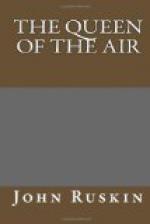134. So far the old lecture. Returning to cool English, the end of the matter is, that, sooner or later, we shall have to register our people; and to know how they live; and to make sure, if they are capable of work, that right work is given them to do.
The different classes of work for which bodies of men could be consistently organized, might ultimately become numerous; these following divisions of occupation may all at once be suggested:
I. Road-making.—Good roads to be made, wherever needed, and kept in repair; and the annual loss on unfrequented roads, in spoiled horses, strained wheels, and time, done away with.
II. Bringing in of waste land.—All waste lands not necessary for public health, to be made accessible and gradually reclaimed; chiefly our wide and waste seashores. Not our mountains nor moorland. Our life depends on them, more than on the best arable we have.
III. Harbor-making.—The deficiencies of safe or convenient harborage in our smaller ports to be remedied; other harbors built at dangerous points of coast, and a disciplined body of men always kept in connection with the pilot and life-boat services. There is room for every order of intelligence in this work, and for a large body of superior officers.
IV. Porterage.—All heavy goods, not requiring speed in transit, to be carried (under preventative duty on transit, by railroad) by canal-boats, employing men for draught; and the merchant-shipping service extended by sea; so that no ships may be wrecked for want of hands, while there are idle ones in mischief on shore.
V. Repair of buildings.—A body of men in various trades to be kept at the disposal of the authorities in every large town, for repair of buildings, especially the houses of the poorer orders, who, if no such provision were made, could not employ workmen on their own houses, but would simply live with rent walls and roofs.
VI. Dressmaking.—Substantial dress, of standard material and kind, strong shoes, and stout bedding, to be manufactured for the poor, so as to render it unnecessary for them, unless by extremity of improvidence, to wear cast clothes, or be without sufficiency of clothing.
VII. Works of Art.—Schools to be established on thoroughly sound principles of manufacture, and use of materials, and with sample and, for given periods, unalterable modes of work; first, in pottery, and embracing gradually metal work, sculpture, and decorative painting; the two points insisted upon, in distinction from ordinary commercial establishments, being perfectness of material to the utmost attainable degree; and the production of everything by hand-work, for the special purpose of developing personal power and skill in the workman.
The last two departments, and some subordinate branches of others, would include the service of women and children.




